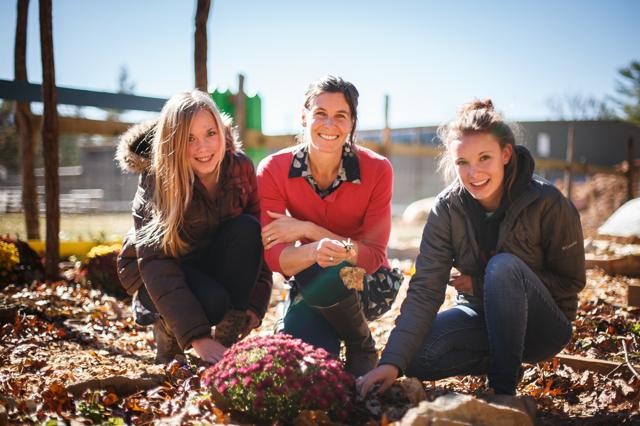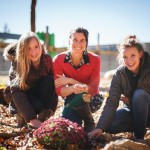- GROUNDED: Marin Leroy, director of environmental education at Evergreen Charter School, spends some time in the school’s garden with students Lila Ryman and Hannah McDonald (from left to right). photos by Nick King
- OUT OF THE BOX: Chuck Marsh, co-founder and co-designer of Earthaven Ecovillage in Black Mountain, urges his students to “get out of the box” and reconnect with nature.
Even in a nature-rich area, residents can lose touch with the environment. “I've been fretting over the disconnection between people and nature for most of my adult life,” says Chuck Marsh, co-founder and co-designer of Earthaven Ecovillage in Black Mountain. This disconnect has a name — nature-deficit disorder — and Marsh and other local educators and activists are trying to find ways to address and prevent it.
“No doubt, people have lost touch with nature in the Asheville area,” says Marsh. “People went into the box — the hermetically sealed containers of house, office and car — and never came out. You can move from one to the other without any connection to nature.”
Nature-deficit disorder is caused by lack of contact with the outdoors. Those suffering from it have developed depression, anxiety, attention-deficit hyperactivity disorder and other health problems. But with awareness starting to spread, Asheville is ahead of the curve in developing initiatives that counteract it, with entrepreneurs like Marsh, programs like those at Evergreen Community Charter School and other schools, as well as the Outdoor Leadership initiative at Warren Wilson College.
Marsh works to deepen our connection with the natural world through projects at Earthaven and with Living Systems Design, a permaculture consulting-and-design business that offers an ecological approach to creating regenerative human habitats. He also operates Useful Plants Nursery, which produces edible plants. “Gardening helps people interact with natural cycles and slow down,” says Marsh. “When I teach workshops, I tell students to slow down and stop talking.”
A lack of connection to nature is, he continues, a failure of intergenerational transfer. Marsh posits that the World War II generation had a history of having to provide for itself, but somehow, the transfer of knowledge and skills to the younger generation got lost.
So educating today’s children about the environment and helping them engage with nature thus becomes key to correcting the problem. At Evergreen Community Charter School in Asheville, environmental literacy is a top priority, and nature is integrated into all subjects. “Connection to nature is important for every stage of development,” says Marin Leroy, Evergreen’s director of environmental education. “It can help children realize their full potential.”
The school boasts an outdoor classroom with a garden and a sustainably built garden hut with a living roof. From kindergarten to eighth grade, students participate in a garden-education program that teaches them about sustainable agriculture. This includes practices such as composting, mulching, cover-cropping and companion planting. Some of the food produced by the garden is donated to feed children who do not have enough to eat.
Even the school’s buildings and campus are designed to create connection with nature, Marin explains. Each classroom opens to the outside as well as the inside. Physical education takes place on a trail in the woods, where students walk and run. There are also “sits spots” on the trail for solitary reflection or writing.
Leroy attributes much of the school’s success to its expeditionary learning model of project-based, interdisciplinary programs. For the third year in a row, Evergreen was designated as an Honor School of Excellence, the highest award given by the state, and students had the highest proficiency levels in reading and math of all Asheville City and Buncombe County elementary and middle schools, she reports.
“The kids participate in full cycles of nature, which creates an experiential kind of knowledge,” says Leroy. “They aren’t just told about things. They learn to transfer knowledge into action and to think critically to solve problems.”
One of the contributing factors to nature-deficit disorder in children is that they do not have as much free time in nature as children of previous generations. Marsh attributes this to the fact that parents might be afraid to let their kids go outside unattended because of “stranger danger.” “Parents are terrorized by the media into thinking it’s unsafe out there,” says Marsh. “But actually, violent crime against young people has gone down. Parents want to protect their kids, but they’re actually harming them.”
Marsh has concluded that this fear is likely driven by corporations who want there to be a higher demand for electronic toys and gadgets that children use indoors. “Fear sells,” he says.
Earthaven was founded “for the children, so they could have free time outside,” Marsh continues. He also helps get children into the outdoors in his School of Integrated Living program, which teaches nature-based skill sets that kids often don’t get from their parents or culture.
When asked what advice Marsh would give to people, he quickly replied, “Walk out the door! We live in a place where you can live eight months of the year outdoors. We need to focus on outdoor living and build smaller houses with more outdoor spaces. We don’t need bigger houses. We need more outdoor rooms such as patios, decks, outdoor kitchens and screen rooms, all of which are cheaper to build anyway. My advice is to get out of the box.”
Science appears to echo Marsh's advice. Jill Overholt, professor of outdoor leadership at Warren Wilson, co-authored the forthcoming book, Natural Environments and Human Health, which compiles research on the positive effects of contact with nature. “We are part of the natural world but we’ve disconnected ourselves,” says Overholt. “Reconnecting has health benefits.”
She mentions some of the studies highlighted in the book, such as one showing that patients recovered faster from gallbladder surgery when their hospital rooms included a scene or view of nature. “Just viewing nature can help us heal,” Overholt explains. Another study found that planting trees in the inner city decreased violence and led to a greater sense of community. Contact with nature can have a positive impact on learning too — one study reported that simply having plants in the classroom helped students learn better. Improvements in learning and health occur, Overholt notes, because “we’re calmer and more focused when we’re around nature.”
“The takeaway message,” Overholt says, “is that time spent in or near nature is so important, and we don’t even have to spend that long. People think they need to do something big like a camping trip, but just a 10 to 20 minute walk can make a significant difference in our well-being.”
— Susan Foster is a retired psychologist and Asheville resident.






Before you comment
The comments section is here to provide a platform for civil dialogue on the issues we face together as a local community. Xpress is committed to offering this platform for all voices, but when the tone of the discussion gets nasty or strays off topic, we believe many people choose not to participate. Xpress editors are determined to moderate comments to ensure a constructive interchange is maintained. All comments judged not to be in keeping with the spirit of civil discourse will be removed and repeat violators will be banned. See here for our terms of service. Thank you for being part of this effort to promote respectful discussion.